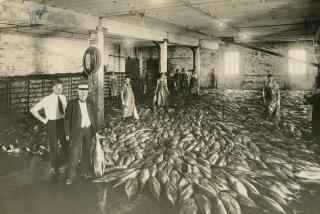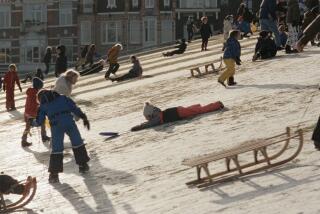Nazi Occupation in WWII Haunts Islands Off Britain
- Share via
LONDON — Adolf Hitler’s ambition to invade Britain during World War II got no farther than the Nazi occupation of the tiny Channel Islands off the coast of France, but peace has been a long time coming there.
More than half a century later, a vituperative war of words rages unabated among historians, journalists, the British public and angry islanders.
On islands out of touch with Britain for nearly five years and so heavily occupied that there was more than one German soldier for every two local civilians, where did forced cohabitation end and treacherous collaboration begin?
The release last week of 11 battered cardboard boxes of British government documents after a 50-year embargo disclosed barbarous Nazi treatment of war prisoners in concentration camps on the island of Alderney, seven miles off the French coast.
But the documents also recounted collaboration, profiteering, informing and extensive liaisons between Channel Islands women and German soldiers, reigniting tensions and accusations.
“Islands of Shame,” said the Guardian newspaper in an opinion column.
“Sheer Nonsense,” retorted the Jersey Evening Press in a banner headline.
“The latest Occupation media circus will bolster the wicked myth which portrays all the Channel Islands as hotbeds of horror, promiscuity, disloyalty and treason,” the newspaper complained.
The self-governing islands of Jersey, Guernsey, Alderney and Sark have a Norman tradition and their own legislatures but have been linked to the British crown for 900 years.
*
When World War II began, about 100,000 people lived comfortably on rural islands known for tourism, new potatoes and tomatoes grown in huge greenhouses. When France fell, the British decided not to defend the islands and offered evacuation to all residents who wanted it. Some left, but thousands remained to witness the unopposed German invasion on July 1, 1940.
What they endured and how they lived and acted over the next five years is the crux of the conflict that has continued since between critics and residents of islands best known now as offshore banking centers.
Britain is as fiercely proud today of its “We shall never surrender!” defiance during the war as Prime Minister Winston Churchill was when he proclaimed it. But in the only part of Britain actually invaded, civilians caught in the middle behaved the same way as most of those in occupied France, the Netherlands or Belgium.
“The islands, like any occupied country in Europe, now have great difficulty coming to terms with their past. It is immensely painful,” said British scholar turned journalist Madeleine Bunting, who has written a history of the occupation.
In the latest tranche of Channel Island documents, a wartime branch of British intelligence called MI19 reports that at least half of the 1,600 mostly Russian prisoners brought to Alderney as slave laborers in 1942 to build fortifications starved to death or were killed by their SS guards.
The release of the documents was delayed until Germany decided not to prosecute a senior Nazi SS officer at the camp on Alderney--called Adolf Island by guards.
Among details of camp atrocities on Alderney, the documents also contain accusations against civilians on Guernsey and on Jersey, the most populous of the islands.
Island informants gave British agents detailed lists of local officials they claimed had profited from the black market and through collaboration with the Germans.
Informants “speak of timidity and passive acceptance of the demands of the occupying forces. The island bosses, moreover, have lived well . . . never short of food, fuel and other commodities that are in short supply,” one report says.
*
Even more damning were the lists of island women who slept with German soldiers and often bore their children.
“The behavior of a great number of women has been quite disgraceful,” one anonymous informant said.
By one account--furiously denied on the islands as grotesquely inflated--about 800 children fathered by Germans were born on Jersey during the war.
One document charges that “the conduct of the women might have been even worse” except that the German soldiers had access to an official brothel, Maison Victor Hugo, staffed by 36 French prostitutes.
“The majority of the Channel Islanders collaborated with the Nazi occupier,” critic Julia Pascal said. “The Channel Islands have never admitted guilt. . . . They see themselves as victims rather than collaborators.”
Pascal has written a play about one of three Jewish women living on Guernsey who, she said, were offered up to the Nazis by the local governor. They died at Auschwitz, the concentration camp.
Seen from the islands--current population about 150,000--the latest British criticism is a replay of a tired old story, no more credible than any that has preceded it.
“Hearsay, rumor, popular mythology and tittle-tattle suddenly acquire the status of truth and are seized upon by writers and broadcasters in search of sensation,” the Evening Press said. “Time after time, Jersey and Guernsey have been tried and unjustly found to have guilty secrets by downright bad journalism. Sadly, this phenomena is in full swing once again.”
Michael Ginns, president of the Occupation Society on Jersey, said the newly released documents present rumors as truth without any attempt to verify their accuracy.
Much of the information, he said, came from islanders who escaped to Britain during the war. They “had chips on their shoulders” and ran down everybody they disliked.
“Once again we are maligned. The whole island is angry,” Ginns said. “The issue here was not collaboration or appeasement but coexistence and survival, everyday people trying to make their way through parallel military and civilian regimes in a time of war and great hardship.”
By 1942, 37,000 German troops were on the islands, a greater concentration of soldiers per square mile than in Germany. There was never much active resistance, islanders acknowledge. But they also ask: How much could there have been in those circumstances?
*
Ruling 60,000 civilians, the Germans manipulated all the levers of power through the accommodating civilian island administration and the island police force.
They controlled the money supply and the jobs, the rations, the transportation, the communications, the entertainment.
Some remote farms remained isolated, but for nearly everybody else, daily cheek-by-jowl association with German soldiers, thousands of them billeted in private houses, was inescapable.
Bunting trod gingerly between claim and counterclaim in a recent book, “The Model Occupation.”
Bunting found heartache and lasting scars: a British soldier coming home with medals for fighting Germans to find that his sister had borne the child of a German soldier when she was 17; husbands returning from British army service to forgive wives who had children by German soldiers because it meant that their own children ate better through five years of privation; islanders who survived blitz and rigor in Britain going back to find relatives who spent the war raising vegetables for the German army.
“The Occupation compromised almost everybody who lived through it; each individual faced moral choices, and only a few could claim a calm conscience by 1945. It is now a minefield of buried resentment and uneasy accommodation,” Bunting wrote.
*
In an interview, Bunting said she had hoped that evenhanded research and a balanced presentation of the occupation would help overcome ingrained defiance among the islanders.
“What I wanted was to look back with compassion and understanding and say, ‘Yes, there were elements of collaboration that require some degree of acknowledgment.’ The islanders couldn’t do that. They are terribly defensive, and this has made them dishonest about their past.”
The book was well-reviewed in Britain and denounced on the islands.
Bunting finds a “there but for the grace of God . . . “ message in the travail of tiny islands conquered by the Nazi enemy.
“That sort of experience tears the emotional fabric of a country. And how hard it is to put saints in one corner and sinners in the other. I think the lesson is that if Hitler had been able to invade England, we would have behaved the same way,” Bunting said.
More to Read
Sign up for Essential California
The most important California stories and recommendations in your inbox every morning.
You may occasionally receive promotional content from the Los Angeles Times.










